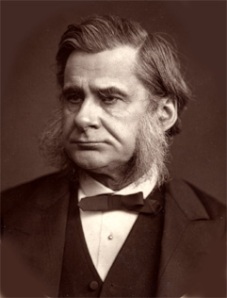May 4: Thomas Henry Huxley
Thomas Henry Huxley (1825)
It was on this date, May 4, 1825, that Thomas Henry Huxley was born in Ealing, near London. He was largely self-educated, read voraciously in science, history, and philosophy, and even taught himself German. As a medical apprentice, Huxley signed on as assistant surgeon with the H.M.S. Rattlesnake, a Royal Navy frigate charting the seas around Australia and New Guinea. It was an opportunity much like the one Darwin had aboard The Beagle, and as with Darwin, the experience changed his life.
He collected specimens and wrote about his observations, so that when he returned to England he found himself a minor celebrity in the scientific community. In 1859, when Charles Darwin's On the Origin of Species was published, Huxley read it and at once remarked, "How stupid of me not to have thought of that." He wrote to the author (23 November 1859):
I finished your book yesterday... As for your doctrines I am prepared to go to the Stake if requisite... I trust you will not allow yourself to be in any way disgusted or annoyed by the considerable abuse & misrepresentation which unless I greatly mistake is in store for you... And as to the curs which will bark and yelp — you must recollect that some of your friends at any rate are endowed with an amount of combativeness which (though you have often & justly rebuked it) may stand you in good stead — ...I am sharpening up my claws and beak in readiness.
His defense of Darwin's theories, and especially to their application to the evolution of the human species, earned him the nickname, "Darwin's Bulldog." Huxley is best known for his famous debate in June 1860 against Archbishop Samuel Wilberforce, who had his own nickname, "Soapy Sam," for his notorious slipperiness in debate. When Wilberforce asked Huxley whether he was descended from an ape on his grandmother's side or his grandfather's, Huxley is said to have replied something like, "I would rather be the offspring of two apes than be a man and afraid to face the truth."
Huxley invented the term agnostic to describe his view, after David Hume, that the mind cannot reach realities beyond the senses. He disdained Christian doctrines and his son, Leonard Huxley, recalled his father saying, "the most remarkable achievement of the Jew was to impose on Europe for eighteen centuries his own superstitions." This lifelong opponent of religion, especially Roman Catholicism—which he described as “carefully calculated for the destruction of all that is highest in the moral nature, in the intellectual freedom, and in the political freedom of mankind”—still approved the reading of the Bible in school. This, he explained (if an edited version could be used in which scientific errors could be excised), would be for certain of its moral teachings and its elevated language, saying, “I do not advocate burning your ship to get rid of the cockroaches.” To Huxley’s feet can be laid credit for the secularization of British society which gradually occurred over the century following his death. Thomas Henry Huxley died at Eastbourne, Sussex, at age 70, on 29 June 1895.
It was Huxley who said,
The improver of natural knowledge absolutely refuses to acknowledge authority, as such. For him, scepticism is the highest of duties; blind faith the one unpardonable sin. And it cannot be otherwise, for every great advance in natural knowledge has involved the absolute rejection of authority, the cherishing of the keenest scepticism, the annihilation of the spirit of blind faith; and the most ardent votary of science holds his firmest convictions, not because the men he most venerates hold them; not because their verity is testified by portents and wonders; but because his experience teaches him that whenever he chooses to bring these convictions into contact with their primary source, Nature — whenever he thinks fit to test them by appealing to experiment and to observation — Nature will confirm them. The man of science has learned to believe in justification, not by faith, but by verification.
Originally published May 2003 by Ronald Bruce Meyer.


